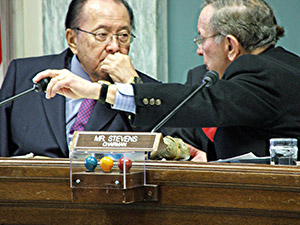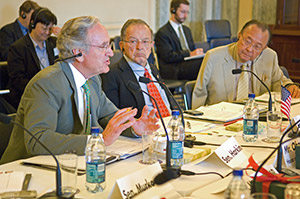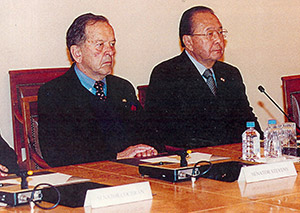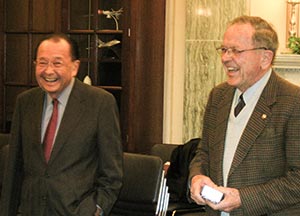
By Mr. Charlie Houy
A staff member of the Senate Appropriations Committee from 1983 until 2013 and worked first for Senator Stevens and then for Senator Inouye.
I don’t know precisely how Senators Inouye and Stevens came to be best friends, but they did eventually referring to each other as brother and even campaigning for one another despite being of different parties. I know one of the more difficult days for Senator Inouye was in August 2010 when he learned that Senator Stevens had been in a plane crash while on a fishing trip in Alaska. Senator Stevens was no longer in the Senate so the two of them were not spending much time together, but they were still close. When news was first received of the plane crash there weren’t a lot of details about survivors only that some had made it. Senator Inouye was sure, despite the odds, that his octogenarian buddy was one of the survivors. When he learned that Stevens had died he was badly shaken.
Senator Stevens and Inouye would seem to have little in common. Senator Inouye represented the progressive wing of the Democratic Party on most issues and Senator Stevens was a conservative. Senator Inouye had a calm demeanor was rarely agitated and almost never angry. Senator Stevens seemed to be in a near constant state of agitation with a fuse so short it could ignite with the slightest spark. Senator Stevens enjoyed exercise, cigars, poker and fine red wine. Senator Inouye liked music, quiet reflection, fine dining, had given up smoking in the 1960’s, and drank only a little alcohol. Despite their many differences, over the years a friendship blossomed and deepened between these two men of very dissimilar tastes, habits, and philosophies. They were the quintessential yin and yang.
They had come to the Senate at the early days of statehood for their respective states. They represented the far West, with strong ties to the Pacific. Hawaii and Alaska being non-contiguous, they also had to deal with the out of sight out of mind mentality that permeates Washington DC. I recall Senator Inouye telling me how it used to cost more to call Hawaii from the mainland than it did to call international long distance. The same was likely true for Alaska. An unfairness he ultimately fixed. Together they served as a non-contiguous caucus, determined to defend the interests of Pacific based states. They locked arms on many occasions to defend the rights of their constituents against those who were insensitive to the needs of states which were separated by geography from the lower 48.
By the time Senator Inouye became Chairman of the Defense Subcommittee in 1989, Senator Stevens had been the chair or ranking member for eight years, but Stevens welcomed Inouye with open arms. They had already been bound by partnership on the Commerce Committee and on many other issues during their early tenure in the Senate. I recall Chairman Stevens telling me in the early 1980’s that whatever Dan Inouye thought the Defense subcommittee should do on military health care policy that was what we were going to do. I remember Senator Inouye attending a Defense subcommittee conference committee meeting during that same period urging the conferees to protect Waikiki based Ft. DeRussy with Senator Stevens rallying to his side.
In addition to their other partnerships, both were strong defenders of the military as might make sense for two tough combat veterans from World War II. Senator Inouye’s story of heroism, receiving the Medal of Honor, is well known, but Senator Stevens’ role in the war was not inconsequential.
Senator Stevens was a pilot in the old Army Air Corps the forerunner of the Air Force. A young man from the Mid-West who ended up being raised by an Aunt in Los Angeles, Senator Stevens joined the Army and became a pilot in 1944. He was one of the brave souls who piloted cargo aircraft in very dangerous missions flying “over the hump” to deliver supplies to Chiang Kai-shek’s Chinese nationalist forces fighting against the Japanese. In fact, he was one of, if not the first American pilot who flew into China as the war reached an end. He told us that, upon landing in Nanking, a Japanese officer came out of the control tower to present his sword in surrender. He told him he didn’t want his sword; he needed gasoline.
Senator Stevens’ ties to China were both professional and personal and deeply held. Serving as President Pro Tempore and Chairman of the Appropriations Committee Senator Stevens worked to create an inter-parliamentary group between the U.S. Senate and the National People’s Congress of China. Senate parliamentary groups already existed for NATO, Russia, Mexico and Canada, but none were with Asian nations. The overseers of the Senate parliamentary groups did not support starting one with China. But Senator Stevens was not to be denied. He circumvented the leadership by inserting language in an appropriations bill mandating the creation of the group. To get it set up Senator Stevens organized several trips to China. One might have expected the Chinese government to be wary of such an alliance, but Senator Stevens’ wartime acts of heroism were well known in China and deeply respected. He was able to knock down almost any wall of Chinese resistance. Senator Inouye was a supportive partner, and in later years, would attempt to set up a similar group with Japan, but he let Senator Stevens take the lead on China. Because Senator Stevens was the President Pro Tem on many of these visits the Chinese referred to him as Mr. President and treated him with enormous deference as might be befitting the man who was third in line for the Presidency – especially in a country where political fortunes were tied more to hierarchy than to elections.
Senator Inouye joined Chairman Stevens on each trip to China, first to plan the alliance and then to take part in parliamentary meetings. That generally required a stop in Beijing, but Stevens was intent on seeing more of China and insisted upon visits to Shanghai, Xian, the far western regions of China and, on one, a stop at Kunming where the Chinese had built a memorial to the crews who flew supplies over the hump to the Chinese military.
The memorial was located at the top of a hill up one hundred steps. There was no way to get to the top except by climbing. That was not a problem for Senator Stevens, a fitness buff who played tennis nearly every day, generally eschewed elevators for stairs and maintained a healthy diet. It was no feat for him to climb 100 stairs. Earlier, when the U.S. delegation visited a section of the Great Wall of China located not far from Beijing, Senator Stevens took great pleasure, like the pied piper, in leading the group of Senators and staff as well as several Chinese Parliamentarians on a half mile march along the wall which snaked across the countryside in a rather steep climb. Several of the Chinese tried to keep pace, but Stevens’ brisk stride along the wall was tough for even many of the younger staff to keep up with. On that occasion Senator Inouye watched Senator Stevens’ hike from the ground deciding to stay put at the base.
At Kunming Senator Inouye had no choice but to make the climb if he were to take part in the planned ceremony at the top of the hill. Now, unlike Senator Stevens, Senator Inouye was not a fitness buff. He ate fairly healthily, except maybe for the hot dogs he enjoyed on many Friday lunches in his office, but he was not one to opt for stairs over elevators. He did not exercise regularly and for a one armed 80-year-old man, climbing multiple flights of stairs was tough. On one of my first trips with Senator Inouye we visited an aircraft carrier. The Captain of the ship was very proud of her and insisted on leading us on a lengthy tour. It required several climbs on ladders which wasn’t easy for Inouye, but what got to the Senator was that instead of starting on one level and proceeding to climb once, we seemed to climb up and then down and then back up and down over and over as we toured the vessel. That day after the carrier visit, Senator Inouye told me he was fine with visiting ships, but in the future he wanted me to make sure there were no more repeated up and down climbs on ladders, up — down, but not more than once. It wasn’t the last time he was to remind me of that ship visit.
When I saw the steps at Kunming and we learned that climbing was the only way to the top, I wasn’t sure what the Senator would do. But, resigned to his fate, the old warrior made the climb and watched as the Chinese conducted a lengthy tribute to Senator Stevens and the Flying Tigers who had supported Chinese in their difficult fight against the Japanese.
Travelling together tightened their bond of friendship. From 1989 when Senator Inouye assumed the Chairmanship of the Defense subcommittee until 2009 when Senator Stevens left the Senate they travelled together many dozens of times, all over the globe, visiting troops, meeting with military and political leaders and representing the U.S. Senate with dignity and hard work. While Congressional travel generally receives a bad name and is considered by many as synonymous with boondoggle, with Stevens and Inouye travel was work: meeting dignitaries, seeing hostile regions first hand, talking to military leaders and troops one on one to assess the military status on the ground. Both of them enjoyed work at least as much as they enjoyed leisure time. For them a foreign trip usually included an itinerary like this. You arrive at a location in the evening, exchange pleasantries with the host nation leaders and the U.S. Ambassador and then check into a hotel. The next morning you travel first to the embassy where you have a private discussion with the Ambassador followed by an embassy briefing on U.S. relations with the host country and a classified briefing. From there you travel to meet with foreign leaders, members of their legislature, and their foreign ministry in the afternoon. The evening generally included an event with the Ambassador and political leaders of the host country. At some point a meeting would be held with the head of state: a President or King. On the second day, you travel to meet with U.S. forces in the region, seeing where they live and work, meeting with their leaders and talking to troops usually over lunch or in small groups. After that it’s back to the hotel for a follow up meeting with embassy personnel or another “social event” including dinners with heads of state on many occasions. The next morning it’s off to the airport and on to the next country. Trips usually lasted about ten days and included stops in four or five countries. The two of them travelled most frequently with only a few staff and military personnel who handled logistics. Occasionally other Senators would be invited to join them, but more often than not, they travelled together.
On one trip with a larger delegation of Senators, they travelled on an Air Force C-32, a modified 757 aircraft which had a private compartment for the senior official on the flight. As was their practice they sat together in this instance in the private room. The room held two comfortable chairs that reclined to a nearly horizontal position and a couch that converted into a small double bed. This was an overnight flight, so the crew came in and made up the bed in the evening. Stevens suggested that since Inouye was Chairman he should have the bed and Stevens would sleep in the chair. Senator Inouye agreed and both lay down to sleep. Inouye was fine, but Stevens couldn’t get comfortable in the chair. So, in the middle of the night, he climbed into bed with Inouye.
The next day Senator Stevens announced to the delegation that he and Dan had slept together the night before and without missing a beat Senator Inouye added, “Yes, but it wasn’t consummated.”
A similar situation occurred on a trip to Afghanistan when they were staying at a makeshift Army base in the region. The camp had a large VIP tent that the hosts suggested the two of them share. Stevens demurred and instead secured a small temporary building similar to a trailer outfitted with a single bed. Inouye was left with the tent. Before retiring Inouye asked where the restroom was in case he needed to use it in the middle of the night. The military officer indicated that you come out of the tent walk about 20 feet turn left and then walk about 100 yards to the latrine. Inouye looked at him and said “Oh? In the middle of the night?” The officer said, “Yes sir.” After the officer left Stevens said conspiratorially, “Dan all you got to do is lift the flap of the tent and go.”
The next morning when asked how everything had gone the night before, Senator Inouye said, “Oh fine. I took Ted’s advice.”
For forty years Senators Stevens and Inouye served together in the Senate with very distinguished careers. Senator Stevens remains the longest serving Republican Senator in history and Senator Inouye the second longest serving Democrat. They served together on the Commerce Committee, each becoming Chairman. So too, they spent decades on the Appropriations Committee including service as Chairmen. And, each ultimately became President Pro Tempore of the Senate as the senior member of their party. But perhaps their most important legacy occurs from their leadership on the Defense Subcommittee. Between 1989 and 2008 they led the subcommittee as Chairman and Ranking member switching back and forth between majority and minority roles five times. At each change they engineered a near seamless transition ensuring that Defense policy stayed on a steady secure path. By partnering together for those twenty years, they established and maintained an unprecedented bi-partisanship in national defense, provided strong and steady oversight and, most importantly, kept our men and women in uniform, their leaders, and the nation’s security in good hands. And maybe, just as important to them, it was where they became brothers.








